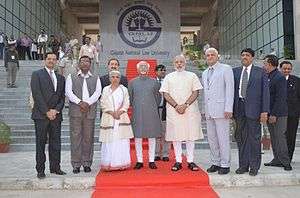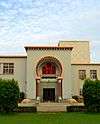Mohammad Hamid Ansari
| His Excellency Mohammad Hamid Ansari | |
|---|---|
|
| |
| 12th Vice President of India | |
|
In office 11 August 2007 – 11 August 2017 | |
| President |
Pratibha Patil Pranab Mukherjee Ram Nath Kovind |
| Preceded by | Bhairon Singh Shekhawat |
| Succeeded by | Venkaiah Naidu |
| Personal details | |
| Born |
1 April 1937 Calcutta, Bengal Presidency, British India |
| Spouse(s) | Salma Ansari |
| Children |
1 daughter 2 sons |
| Relatives |
Mukhtar Ansari Sibakatullah Ansari Afzal Ansari |
| Alma mater |
University of Calcutta Aligarh Muslim University |
Mohammad Hamid Ansari (![]()
Ansari worked as an ambassador and served as the Vice-Chancellor of the Aligarh Muslim University from 2000 to 2002.[2] Later he was Chairman of the National Commission for Minorities[2] from 2006 to 2007. He was elected as the Vice-President of India on 10 August 2007 and took office on 11 August 2007. He was reelected on 7 August 2012 and was sworn-in by Pranab Mukherjee, the President of India. The oath taking ceremony was conducted at Rashtrapati Bhavan on 11 August 2012.[3] His second term ended in August 2017 since he was not offered another term,he decided not to run for a third term in the 2017 vice-presidential election. Upon the inauguration of Ram Nath Kovind as President of India in 2017, Ansari became the first Indian Vice-President to serve during the terms of three presidents. He was the longest serving chairman of Rajya Sabha.
Personal life
Ansari was born on 1 April 1937 at Calcutta, Bengal Presidency (present day Kolkata in the state of West Bengal) to Mohammad Abdul Aziz Ansari and Aasiya Begum. Though his ancestral home is in the city of Ghazipur of the Uttar Pradesh state, he spent his formative years in Kolkata. He is a grand-nephew of former Indian National Congress president and freedom fighter Mukhtar Ahmed Ansari.[4] He is also related to the Uttar Pradeshi politicians Mukhtar Ansari, Afzal Ansari and Sibakatullah Ansari.[5]
Ansari did his schooling from St. Edward's School of Shimla. After attending the St. Xavier's College of Kolkata, he pursued his Master of Arts and Doctor of Philosophy degree from the Aligarh Muslim University.[6] He is married to Salma Ansari, fathering two sons and one daughter.[7]
Early career
Joining the Indian Foreign Service in 1961, Ansari subsequently served Indian missions in Baghdad, Rabat, Brussels and Jeddah.[8] From 1976 to 1980, he served as the Indian Ambassador to the United Arab Emirates. Mohan Jashanmal, the Chairman of Indian Business and Professionals Group said that "Ansari was instrumental to get land for the Indian School from His Highness Shaikh Khalifa Bin Zayed Al Nahyan".[9] He has also served as the Indian ambassador to Australia (1985–1989), Afghanistan (1989–1990), Iran (1990–1992), Saudi Arabia (1995–1999).[10] He also served as the Permanent Representative of India to the United Nations from 1993 to 1995.[7] His deputy T. P. Sreenivasan wrote that while Ansari's stint as the Permanent Representative, he refuted Pakistan's allegations of human rights abuses in Jammu and Kashmir by "the horns and subdued it whenever necessary". He also wrote that appointing Ansari for this post at a time when "Pakistan went all out to bring Kashmir to the centre of international attention after the end of the Cold War" showed India's secular credentials.[11]
After serving as a visiting professor of the West Asian and African Studies Department of Jawaharlal Nehru University from 1999 to 2000,[7] Ansari was appointed as the vice-chancellor of the Aligarh Muslim University on 23 May 2000.[12] After leaving the post in 2002, he served as a visiting professor of the Academy for Third World Studies Department of the Jamia Milia Islamia from 2003 to 2005.[7]
Ansari became the chairman of India's National Commission for Minorities (NCM) on 6 March 2006.[13] In June 2007, Ansari, in his capacity as NCM chairman, upheld the decision of St. Stephen's College, Delhi to earmark a small percentage of seats for Dalit Christians.[14] He resigned as NCM chairman soon after his nomination for the post of India's Vice-President.
Vice-President

On 20 July 2007, Ansari was named by the UPA-Left, the ruling coalition in India, as its candidate for the post of Vice-President for the upcoming election. When asked, Ansari said he felt "humbled" over the UPA-Left decision naming him as their candidate. "I am humbled by the confidence reposed in me". Ansari refused to say more when asked about his prospects in the August 2007 Vice-Presidential election.[15] Ansari secured 455 votes, and won the election by a margin of 233 votes against his nearest rival Najma Heptullah.
In 2012 VP election, the Congress-led UPA re-appointed Ansari as their candidate for the post of VP. The NDA nominated Jaswant Singh, former Finance, External Affairs and Defence minister as well as former Leader of Opposition.[16] The NDA cited Ansari's conduct in the Rajya Sabha during The Lokpal Bill, 2011 debate when he had abruptly adjourned the House sine die.[17] Hamid Ansari was re-elected for the second term on 7 August 2012, defeating the NDA's nominee Jaswant Singh by a margin of 252 votes.[18]
According to the Constitution of India, Ansari, as Vice-President of the Republic, also serves ex officio as Chairman of the Rajya Sabha.
Views and quotes
Ansari is a West Asia scholar and has written on the Palestinian issue and taken positions inconvenient to the Indian official line on Iraq and Iran. He questioned India’s vote in the International Atomic Energy Agency on Iran’s nuclear programme where India voted against Iran. He said that though the Indian Government claimed to have acted on "its own judgement," this was not borne out by facts.[19]
He was the chairman of a working group on "Confidence building measures across segments of society in the State," established by the Second round Table Conference of the Prime Minister on Jammu and Kashmir in 2006. The report of the working group was adopted by the Third round Table in April 2007. Among other things, the report advocates recognizing the right of Kashmiri Pandits to return to "places of their original residence". This right, it argued, should be recognized without any ambiguity and made a part of state policy.[19]
Ansari feels that there is a sense of unease among Indian Muslims. He said this on the last day of his tenure as the Vice President of India, one of the highest constitutional posts in the country.[20] Ansari's comment was met with a gibe by India’s prime minister Narendra Modi.[21]
Ansari quoted, "The language used by the Pope sounds like that of his 12th-Century counterpart who ordered the crusades... It surprises me because the Vatican has a very comprehensive relationship with the Muslim world." – 15 September 2006, as Chairman of the Minorities Commission of India, on the Pope Benedict XVI Islam controversy.[22]
"No citizen is apolitical; as a citizen, by definition, has to take interest in public affairs.” – 10 August 2007, after being elected Vice-President, on being asked whether he is apolitical.[23][24]
"There is no shame in acknowledging the faults and the lacunae that exist in the policies and institutions pertaining to Human Rights." -26 September 2013, addressing the First Convocation of Central University of Bihar.[25]
See also
Notes
- ↑ "Mohammad Hamid Ansari Biography - Vice President of India". Britannica.com. Retrieved 21 September 2015.
- 1 2 "Ansari almost missed V-C post in AMU". Hindustan Times. Archived from the original on 12 May 2012. Retrieved 8 May 2012.
- ↑ Business Standard (11 August 2012). "Hamid Ansari sworn-in as Vice President for second term". Business Standard. Retrieved 20 August 2012.
- ↑ "Who is Mohammed Hamid Ansari?". NDTV. 7 August 2012. Retrieved 4 January 2018.
- ↑ "3 brothers, 5 seats, jail: no getting away from the Ansaris of Poorvanchal". Indian Express. 12 May 2014. Retrieved 4 January 2018.
- ↑ "Hamid Ansari sworn in as vice-president". DNA India. 11 August 2012. Retrieved 4 January 2018.
- 1 2 3 4 "Sh. M. Hamid Ansari". Vice President of India. Retrieved 4 January 2018.
- ↑ "Hamid Ansari: Seasoned diplomat and scholar, respected leader". Two Circles. 14 July 2012. Retrieved 4 January 2018.
- ↑ "Ansari cherishes UAE experience". Gulf News. 23 July 2007. Retrieved 4 January 2018.
- ↑ "India's vice president to visit Uganda". New Vision. 16 February 2017. Retrieved 4 January 2018.
- ↑ T. P. Sreenivasan (16 August 2017). "Hamid Ansari: an intellectual liberated". The Hindu. Retrieved 4 January 2018.
- ↑ "Former diplomat named new AMU Vice-Chancellor". The Hindu. 23 May 2000. Retrieved 5 January 2018.
- ↑ "NCM website – current commission". Archived from the original on 28 June 2007.
- ↑ "St Stephens reservation row". newspostindia.com.
- ↑ "Ansari named UPA-Left candidate for Vice President Poll". ibnlive.com.
- ↑ "VP Poll: Jaswant Singh Vs Hamid Ansari". Outlook India. 16 July 2012. Archived from the original on 17 July 2012. Retrieved 7 August 2012.
- ↑ Andrew MacAskill and Bibhudatta Pradhan (30 December 2011). "Singh Caps 'Annus Horribilis' With Anti-Graft Law Stymied by Upper House". Bloomberg. Retrieved 3 June 2012.
- ↑ "Hamid Ansari retained seat as Vice President". 7 August 2012. Archived from the original on 12 May 2013.
- 1 2 "Hamid Ansari: versatile scholar, statesman". The Hindu.
- ↑ "Asserting Your Nationalism Day In, Day Out Is Unnecessary: Hamid Ansari – The Wire (full transcript)". The Wire. Retrieved 2017-08-10.
- ↑ "The unfinished Partition of India and Pakistan". The Economist. 17 August 2017. Retrieved 19 August 2017.
- ↑ "In quotes: Muslim reaction to Pope". BBC News. Retrieved 13 August 2007.
- ↑ "Anticipation, trepidation, says Ansari". The Hindu. Retrieved 13 August 2007.
- ↑ "Hamid Ansari defeats Jaswant Singh, re-elected as the Vice President". bengalnewz.com. Retrieved 7 August 2012.
- ↑ "Full Text of Vice President Hamid Ansari's Speech at Convocation of Central University of Bihar". Retrieved 26 September 2013.
External links
| Wikimedia Commons has media related to Mohammad Hamid Ansari. |
- Profile at Indian Government website
- Iran Today: Twenty – five Years after the Islamic Revolution (Rupa, New Delhi,2005) ( ISBN 81-291-0774-0)
- Hamid Ansari: versatile scholar, statesman
- Goof up leaves Ansari fuming
| Academic offices | ||
|---|---|---|
| Preceded by Mahmoodur Rahman |
Vice Chancellor of Aligarh Muslim University 2000–2002 |
Succeeded by Naseem Ahmad |
| Political offices | ||
| Preceded by Bhairon Singh Shekhawat |
Vice President of India 2007–2017 |
Succeeded by Venkaiah Naidu |
